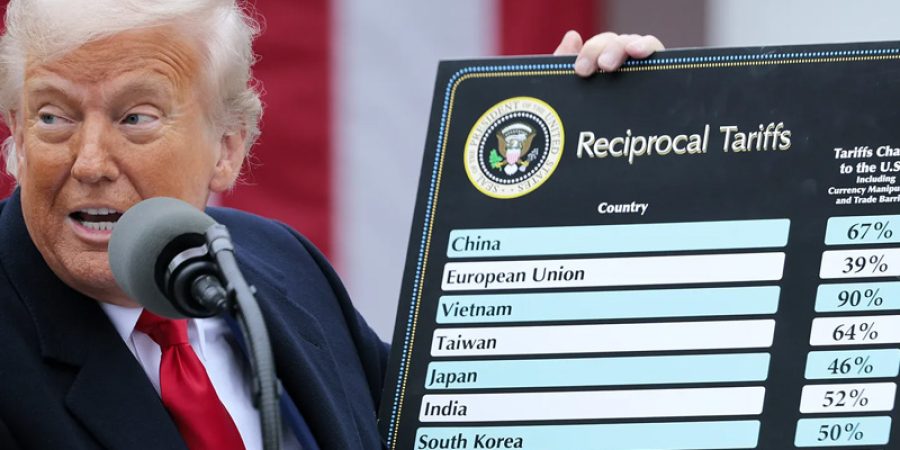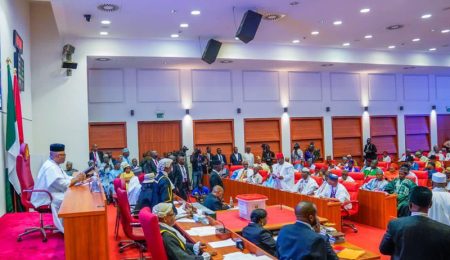United States President Donald Trump has issued a sweeping executive order imposing a 15 percent tariff on Nigeria and multiple of African countries, triggering widespread concern over trade disruptions.
This comes as leaders of more than 60 countries have been plunged into a fresh race to secure trade deals with the US after Trump unleashed global chaos with sweeping new tariff rates. Trump’s latest blitz triggered a wave of market jitters and fears for jobs in some of the poorest countries, as tariff rates were signed off ranging from 50 per cent to 10 per cent.
Owing to the move by the U.S government, Citigroup’s Head of Sub-Saharan Africa, Akin Dawodu, warned that the tariff regime targeting African countries could deepen the continent’s economic shift towards alternative global trade partners, particularly China, the European Union, and the Middle East.
In an interview, Bloomberg quoted Dawodu to have said the U.S. decision to impose tariffs of up to 30 percent on imports from South Africa, Algeria, Nigeria, and Ghana may further reduce Africa’s already marginal position in American trade.
The naira depreciated marginally on the official forex market as it closed at N1,555 to a dollar, lower than the N1,550 to a dollar it closed the previous day. On the official arm of the forex market, the nation’s currency maintained its previous day’s value of N1,533 to a dollar on Friday.
Also, despite the development, the Nigerian stock market was unfazed as it closed on a positive note on Friday, as the All Share Index increased by one per cent to close at 141,263.05. Also, the market capitalisatioon of the Nigerian Exchange Group (NGX) increased to N89.373 trillion from N88.425 trillion as at the previous close.
The total volume traded closed with an exchange of 1,079.170 million units valued at N26.85 billion traded in 34,488 deals. However, the market breadth was negative with 34 gainers as against 35 losers.
The White House announced the modified reciprocal tariff rates on Thursday.
Earlier in April, Trump had slammed sweeping tariffs on global trading partners, imposing 14 percent on Nigeria.
The “reciprocal” tariffs were later postponed for 90 days to allow for time to negotiate individual trade deals, with the deadline moved to on Friday. But there was a minor reprieve that opened the door to further negotiations, after the White House said the updated tariffs would take effect on August 7, and no longer on Friday.
For Africa, despite the extensions, most talks failed to produce new agreements, triggering the rollout of increased tariffs under Trump’s revised global scheme.
In the continent, the US did not strike a single trade deal with any country, despite frantic efforts by several officials on either side of the divide. Nigeria was not initially included, but was later added as the policy evolved.
The new rates, which Trump sees as benefiting US exporters, create uncertainty for dozens of countries, including longtime US allies. They have also raised fears of inflation in the US, UK-based The Guardian reported.
Meanwhile, Dawodu, has warned that the new U.S. tariff regime targeting African countries could deepen the continent’s economic shift towards alternative global trade partners, particularly China, the European Union, and the Middle East.
“China is already Africa’s largest trading partner, with the EU following closely. These new tariffs will likely accelerate that shift,” Dawodu said.
Dawodu said Africa’s vast natural resources, including 60 percent of the world’s remaining arable land and a third of its mineral reserves, make the continent indispensable to future industries—especially those powering artificial intelligence and advanced manufacturing.
“There are global markets for Africa’s resources; they don’t have to rely on the U.S.,” Dawodu added.
Dawodu noted that intra-African trade holds the key to long-term economic resilience.
He urged African governments to tackle non-tariff barriers, including inconsistent legal frameworks, logistical bottlenecks, and labor mobility restrictions—issues that continue to hamper regional integration.
Dawodu highlighted the potential of the African Continental Free Trade Area (AfCFTA) to lift Africa’s global trade standing if effectively implemented.
He added: “AfCFTA could increase Africa’s share of global exports to 4.4% by 2043, up from the current 3.5 percent. Africa’s growth will be increasingly propelled by its youthful population and rising consumer class. These are fundamentals that can withstand short-term disruptions like tariffs.”
Sunday Ehigiator
Follow us on:

